A technical SEO audit makes sure that your website is up to par for visitors that come to your website. It covers your site security, usability of the website, but most importantly, the ability of search engines to access and crawl your website. The basic parameters of a technical SEO audit include the following:
- A complete review of your title tags, meta descriptions, and headline tags.
- Checking on the security of your website, like an SSL certificate.
- Makes sure that your website is usable on all types of devices (desktops, laptops, smartphones, and tablets).
- Making sure that all links on your website work.
- Ensures the overall usability of your website.
Bringing customers to your business hinges on the ability to attain high search engine rankings for your brand. With the first page of results getting 71% of clicks, you can understand the importance of ranking highly.
Achieving top rankings isn’t a matter of luck. It’s a product of smart work and knowledge of how search engines operate. While Google doesn’t disclose details on its search engine algorithms, we can get a good idea from studying outcomes.
Search Engine Optimization, or SEO, is the process of making changes to your website to improve your rankings. A good marketing strategy starts with assessing your website’s current situation. You achieve this by conducting a technical SEO analysis.
What is a Technical SEO Audit?
A technical SEO audit is a process by which you assess the technical aspects of your SEO. It’s similar to a medical checkup. You take an in-depth look at your website’s health to make necessary changes.
A physician will take a look at the patient, request a blood test and may even call for an x-ray. Similarly, a website technical audit starts with a look on the surface and delves deep into its structure. This includes the use of software tools that provide valuable insights.
How Search Engines Evaluate Your Website
Until recently, search engines judged websites on a list of almost exclusively quantitative metrics. Google bots scanned the pages of your site to see what keywords you use, how many websites link to your content and what the general structure is. This allowed website administrators to game the system by giving the bot what it was looking for.
With each update to Google’s algorithm, the ability to judge websites on qualitative aspects increases. Most recently, Google uncovered the Bert update.
As per Google, Bert gives the search engine language processing capability. It provides the ability to judge content semantically. This means that rankings are made to suit human visitors and the language they prefer to use. It also means that factors like site speed and design come into play more than backlinks and keyword density. Check out this example of what these changes look like in an SERP page:

(Image credit: searchengineland)
Test your SEO in 60 seconds!
Diib is one of the best SEO tools in the world. Diib uses the power of big data to help you quickly and easily increase your traffic and rankings. We’ll even let you know if you already deserve to rank higher for certain keywords.
- Easy-to-use automated SEO tool
- Keyword and backlink monitoring + ideas
- Speed, security, + Core Vitals tracking
- Intelligently suggests ideas to improve SEO
- Over 500,000k global members
- Built-in benchmarking and competitor analysis
Used by over 500k companies and organizations:
Syncs with 
Benefits of an SEO Audit for Your Business
Conducting a website technical audit puts your business in a better position to compete in your niche. The benefits of a website technology audit will translate to better brand exposure and an increase in sales.
Define Your SEO Strategy
Search engine optimization is more than just a list of tasks to complete. A focused strategy can take your brand in the direction you desire.
Defining a clear SEO strategy involves making adjustments to fit your marketing message. Targeting a group of keywords that is relevant to your audience will keep you within the scope of your market.
Optimizing your images and adjusting your backlink strategy will make your site climb the rankings for valuable keywords. Everything you do to optimize your website should be within your brand’s marketing strategy.
Changes you apply should aim at making your site available to people who will benefit from your products and services. From content to site design, keep your end goal in sight.
You Might Also Like
FACT: 82% of people who implemented an SEO strategy found it to be effective. (Safari Digital)
Find Out Your Website’s Weaknesses
A technical SEO analysis will help you determine where your website is lagging. Sometimes despite your best efforts, some areas aren’t performing optimally or could be augmented. For instance, your content may not be taking advantage of laser-targeted keywords. By rethinking your use of keywords, you may be able to get your products and services in front of qualified prospects.
Duplicate content and low-quality backlinks can also be weaknesses that you need to identify. Dealing with these hidden ailments will signal to Google that your site is ready for better rankings.
Conduct Competitive Analysis
A byproduct of a technical site audit is the gaining of greater insight into your competition. Your analysis will cause you to look at why you are ranking lower than your competition. As a result, you will understand things about their marketing and brand positioning.
For example, keyword research will cause you to look into the scope of words and phrases your competitors use. Furthermore, their calls to action, website design and links profile will give you valuable tools to maneuver your brand. This is just one example:
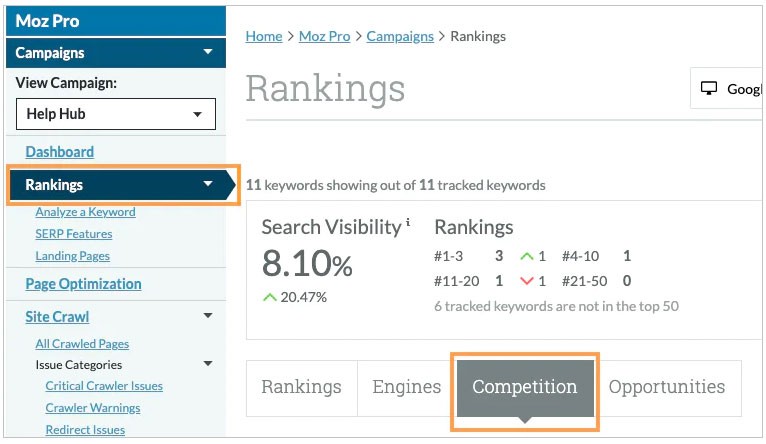
Why Make a Checklist for Your SEO Audit?
Having a technical SEO audit template to guide you will guarantee you achieve measurable results. Auditing your website is a nuanced process with many details to cover. Without a checklist, you’ll be prone to leave a lot of valuable ground uncovered.
By using a checklist, you can prioritize tasks. You can also break them down in a way that makes sense for your website and your schedule. It may make sense to start by doing some A/B testing to discover what is currently working and what needs to be changed.
A/B testing is a method of putting two different versions against each other to choose the most effective one. You can perform A/B tests on your calls to action, your design, your content or anything else that can benefit from such a comparison.
Therefore, it makes sense to write a detailed checklist beforehand. It will help you stay on task and make your audit as productive as possible. This is an example of what a free technical audit checklist may look like:
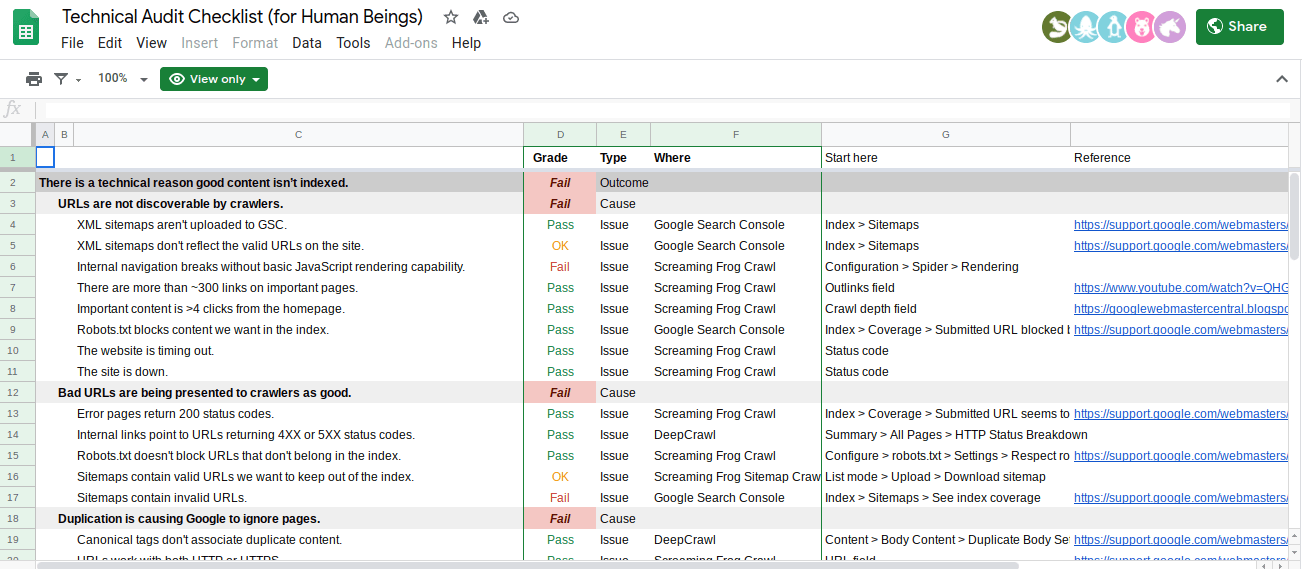
When to Perform a Technical SEO Audit
While an SEO audit can help you when your website is trailing your competition, you shouldn’t wait to fall behind to perform one. Several circumstances make a website technology audit necessary.
Google and other search engines are constantly changing their algorithms. In their quest to provide users with the most relevant content, major or minor updates are made. If your website doesn’t comply with the most recent set of rules that Google sets for its bots, your business can suffer.
It isn’t uncommon for entire sectors to be affected by Google updates. Websites can lose anywhere from 10% to over half their traffic after such changes. It’s important to stay up to date with what Google is doing and to remain vigilant in performing SEO audits.
Furthermore, while you may perform a full audit every six months, you may want to schedule some time every month for a quick look. Mini-audits performed monthly can give you an advantage over your competition if you catch a new algorithm trend early. Diib® offers technical monitoring for up to 30 websites all in one easy to understand platform. Here is an example of one of them:
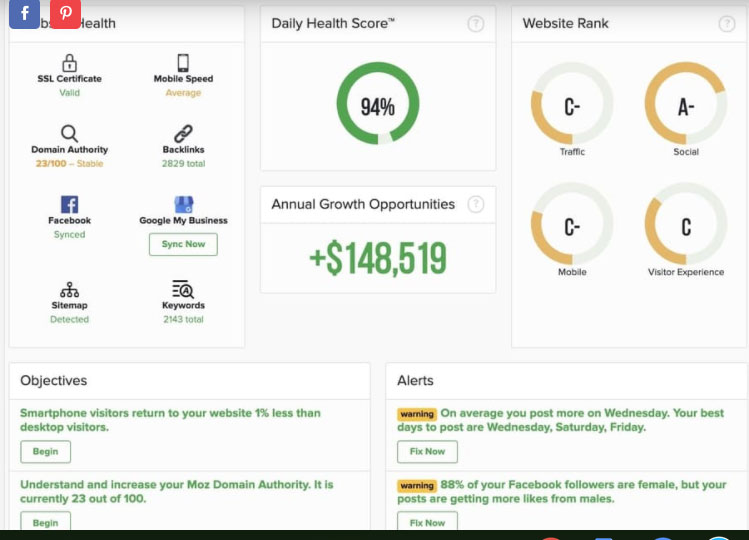
What Makes a Good Technical Audit?
A good audit begins with a technical SEO audit template. You should have a clear-cut process to follow. This will keep the time spent on the audit to a minimum. An effective audit should be thorough but not overly time-consuming.
If you do everything right, you should have measurable results with which to draw useful conclusions. A good technical audit should give you feedback about your business and cause you to make adjustments to your online marketing.
Structure is Always a Good Thing
Your marketing should have a healthy dose of creativity that results from brainstorming and ideation. Your SEO audit, on the other hand, needs to be a process based on structure. A website will succeed or fail based on how closely it follows the criteria set forth by search engines.
The way to meet these criteria is to have a process in place that identifies the structural elements necessary to achieve top rankings. Even the audit itself needs to be a structured process that starts with a technical SEO template.
Technical Audit Tips
With practice, technical audits will become second nature. However, it’s good to have a few things in mind to make them more productive.
Start with your Hosting
Your website hosting should be part of your audit. Tasks that your hosting provider performs have a direct influence on your site. For instance, site speed depends as much on your hosting provider’s infrastructure as it does on tasks you perform. Here is a visual so you can easily see where web hosting comes into play:
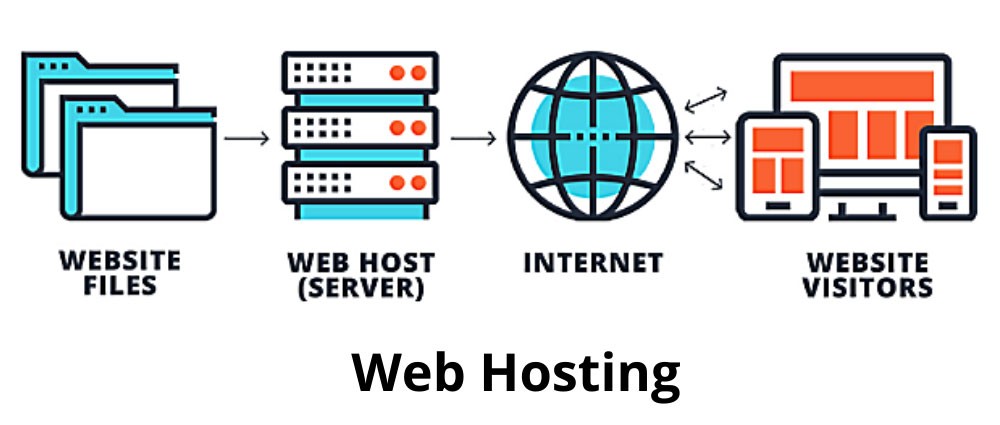
Hosting providers are businesses and as such are constantly looking to reduce costs. If your web host makes changes that affect your website but doesn’t inform you, your business can suffer.
Use a Spreadsheet to Record Measurable Data
As search engines change their algorithms, groups of data may become more or less relevant. Having detailed records of your audits will allow you to pinpoint what works now as compared to what worked before. Also, using an easy-to-read spreadsheet will save you the time of having to go through lengthy notes.
Key Elements of an SEO Audit
The degree to which you wish to delve into your SEO depends on how extensive you wish your analysis to be. Other than your web hosting, other elements that are important to include in your SEO audit include:
Keywords
In recent years there is a lesser emphasis on keyword density and greater importance on long-tail keywords. This means that you no longer have to stuff your main keyword in your text. It is, however, recommended that you include as many related phrases as possible.
If you want to target local audiences, including keywords that identify your location is important. You should also consider keywords that relate to your target demographic. Go into your audit as if you were a user searching for your product or service. That way you can come up with keywords that will be useful to add to your list. Competitive analysis is a good way to augment your keyword list. The Diib Keyword Analysis tool allows for both monitoring of your own keywords as well as those of your competitors. Here is what that page looks like:
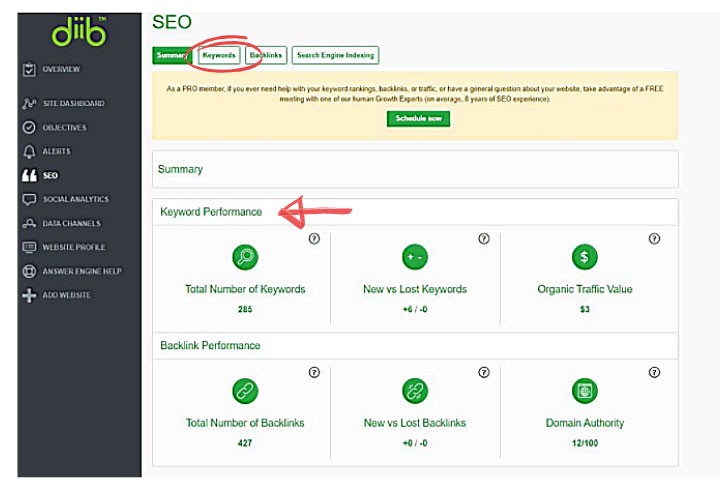
Content
Keywords are the building blocks of your content. However, your content takes on a life of its own. Your content needs to read in a way that appeals to your target audience. Again, competitive research is the best way to benchmark your content.
Take note of the tone of the language the top-ranking websites in your niche use. Are you in a niche that requires technical jargon or should you keep your text at a 12th-grade reading level?
Metadata
Metadata is information that appears under the hood, so to speak. It is data such as the title of a web page and the meta description that is used by search engines in their results.
This data is less significant for search engines than it used to be a few years ago. That doesn’t mean that it has lost all its value. Google still uses metadata in determining where to rank websites. Here are examples of metadata:
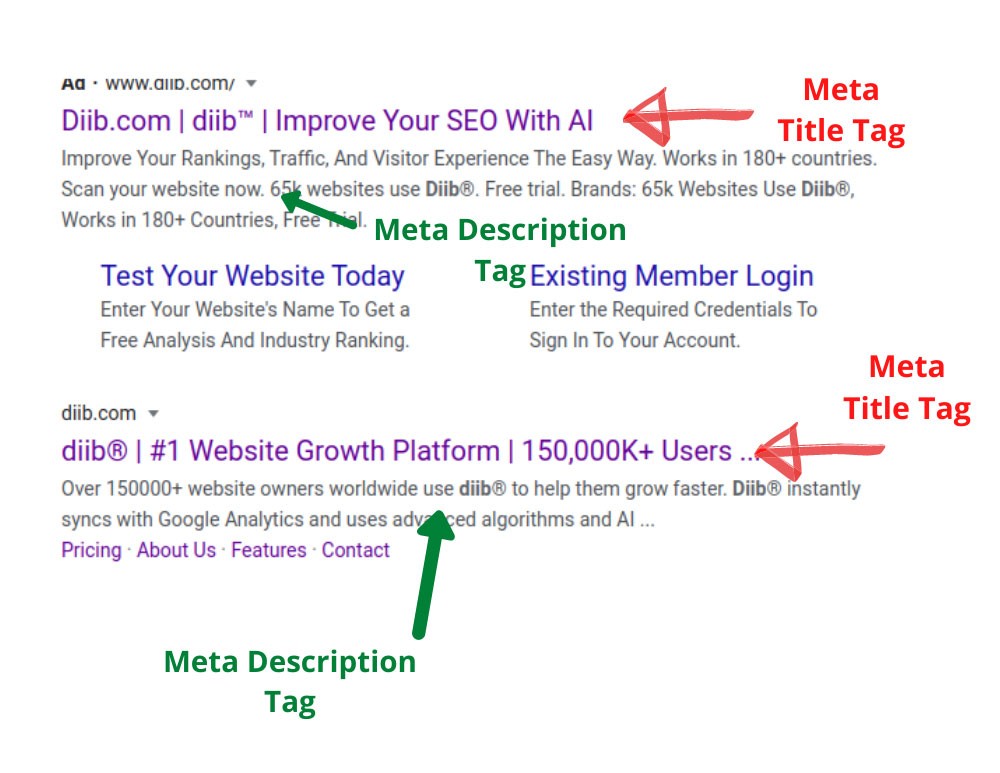
Providing appropriate metadata for your content is like putting a spoiler on a race car. It gives you an extra bit of a push when Google’s bot crawls your website. Keep metadata within the character limits that Google suggests and try to include your main keywords.
Links
Links are another aspect of SEO that has a diminished role in today’s search engine rankings. Having said that, you still want to make sure that you don’t have spammy, low-quality websites linking to your site.
Your SEO audit should be as much about backlinks as it is about internal links. Google rewards websites that users spend a lot of time on. By linking related posts and pages, you are ensuring that users will be spending more time navigating your website. The Diib Backlink tool allows you to see all links to your site, whether good or bad, and take appropriate action.
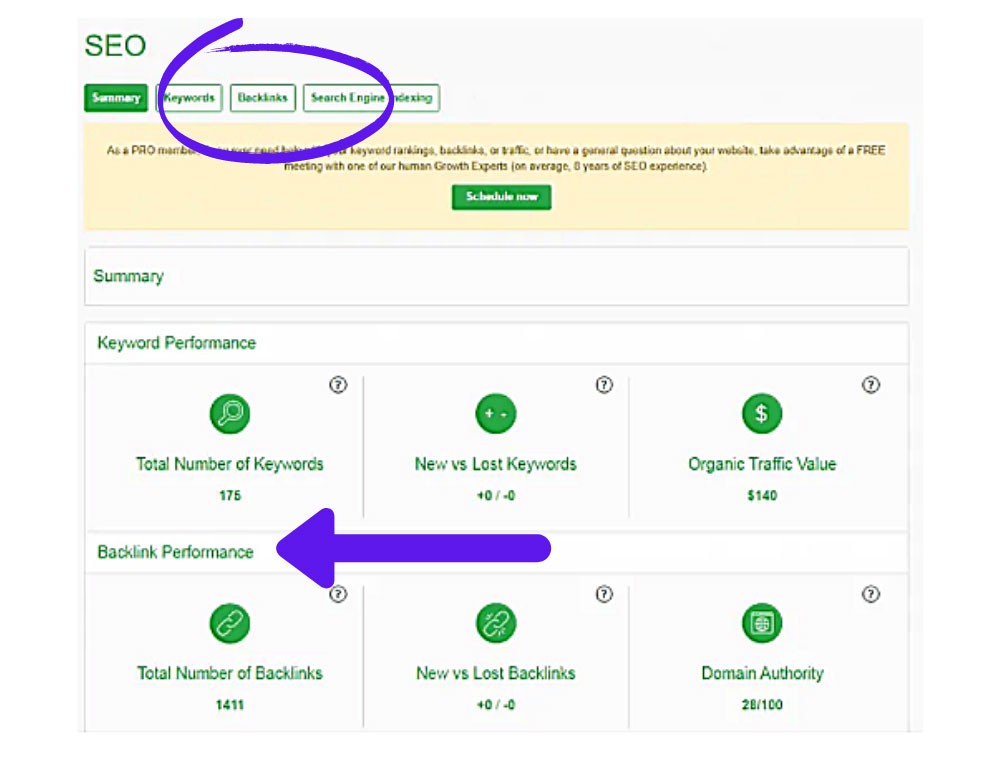
How to do a Technical SEO Audit
Now that you understand the importance of audits and the key elements to focus on, you’re ready to learn how to do a technical SEO audit. Let’s look at the step-by-step process you should follow and adapt to your own business needs.
1. Perform a Crawl
A crawler is a software program that search engines use to scan websites and collect data from them. It records information about website text and links and stores it so that it can be used in the ranking process.
For you to conduct an effective audit, you need to have a good idea of what the crawler “sees.” There are various online tools, both free and paid, that you can use to perform a crawl. The crawl should give you a snapshot of your website’s health upon which your audit will be based. Here is one example of a company that can crawl your site:
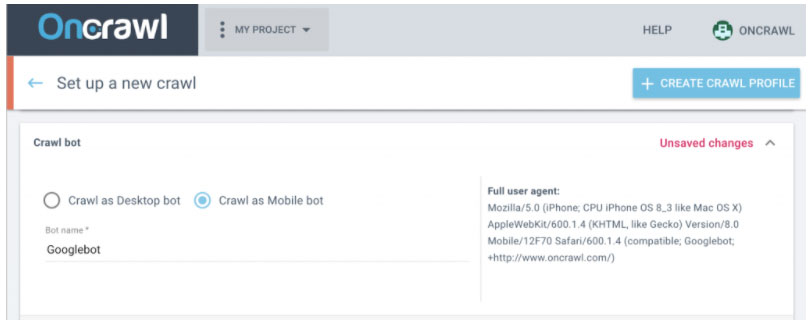
(Image credit: Oncrawl)
2. Check your Site Versions
Google penalizes websites that have multiple versions available to be viewed. Installing an SSL certificate will make sure that your website displays an https in its address. Websites that do not designate a specific version but are open to being searched in multiple versions present a problem when being searched.
Another example of this is mobile-responsive sites. Sometimes mobile versions of websites can appear in desktop search results. This created confusion in the algorithm and can result in your website receiving a lower ranking.
Avoiding duplicate content falls under this task. You should consolidate any pages or posts that contain identical content to avoid being penalized.
FACT: According to industry experts, it is estimated that up to 29% of the web is actually duplicate content.
3. On-Page SEO Check
Make sure your content is organized in a logical hierarchy. You want your navigation menus to be intuitive and your subcategories to fall under the proper categories. Go through your content and make sure that your posts are organized in a way that reflects how they are related to one another.
Furthermore, you want to go through your content and make sure that your posts are optimized. Make sure that you include valuable keywords in your header and subheaders. Also, try and include as many long-tail keywords as possible in a natural way.
4. Conduct a Link Check
Backlinks and internal links are important for helping your users find the content they are looking for. In the case of backlinks, you are signaling to search engines that your content is deemed important by other websites. Therefore, you want to make sure that these links are coming from high-quality websites and not from dubious, spammy ones.
Doing this manually would take a very long time. That’s why there are software tools that make this process a matter of minutes. Here is an example of a backlink checker:
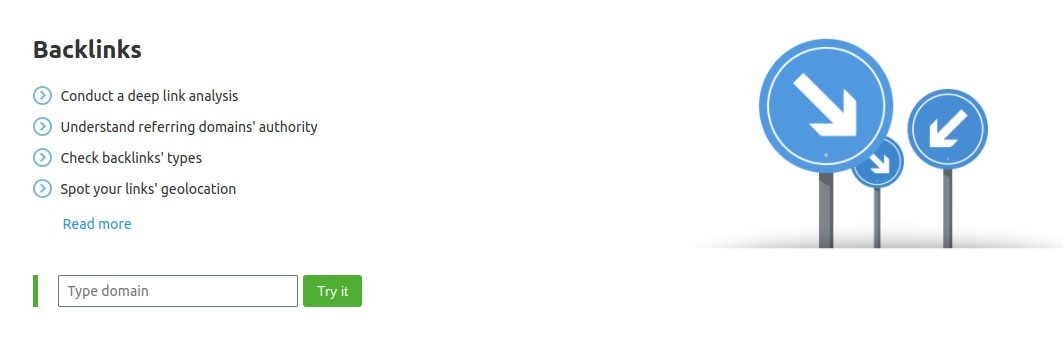
5. Clock your Site Speed
Site speed is a key metric for search engines. The faster your website loads, the more your visitors are likely to stick around and consume your content. Start with Google’s own PageSpeed Insights. It will give you valuable suggestions about how you can improve your site speed.
6. Make Analytics Comparisons
How long are users staying on your website? How many pages does each visitor view before clicking away to some other part of the web? These, and many other metrics, are available in Google Analytics. This is where keeping a spreadsheet comes in handy.
If you find that people are spending less time on your site or that they are clicking away after seeing just a single page, you may have to focus on your content. You may also need to improve the design and other visual elements.
We hope that you found this article useful.
If you want to know more interesting about your site health, get personal recommendations and alerts, scan your website by Diib. It only takes 60 seconds.
7. Manually Search Your Site
Even though you use many software tools to conduct your audit, your website is ultimately targeted at human audiences. Take the time to conduct manual searches both on search engines and on your site. You want to view your site as your visitors do. This will allow you to make qualitative judgment calls on what changes you should perform.
Diib®: Start Your Audit Today!
If you are looking to boost your results, a technical site audit will amplify your business efforts. The sooner you perform an audit on your site, the sooner you can increase your business leads and build authority for your brand online. Diib® offers a free 60 second website analysis that will help you know where you stand technically. Here are some of the features that set us apart from the crowd:
- Bounce rate monitoring
- Post performance
- Broken pages where you have backlinks (404 checker)
- Keyword, backlink, and indexing monitoring and tracking tools
- User experience and mobile speed optimization
Get a free 60 second site scan or simply call 800-303-3510 to speak to one of our growth experts.
FAQ’s
Technical SEO is the method of improving the overall technical aspects of your website in order to improve website ranking. This can include: improving speed, crawlability, backlink health and user friendliness.
Depending on the overall size and health of your website, an in-depth audit can take anywhere from 2-6 weeks. Due diligence is necessary to make sure accurate, impactful recommendations are made and accomplished. This often requires the help of an SEO specialist.
EO can be an expensive and time consuming process. It takes time for results to show up and time to build and maintain a campaign. It also often requires the help of experts in the SEO field to get it right.
This can vary, again, due to the size of your website and overall health. That being said, they typically start around $5,000. And we’ve seen prices close to the $30,000 range.
According to Wikipedia, a “website audit is a full analysis of all the factors that affect website’s visibility in search engines. … Website audit is completed solely for marketing purposes. The goal is to detect weak points in campaigns that affect web performance.”




Laktotech Labs Private Limited says:
Thank you for sharing this information. This information is very useful to us.